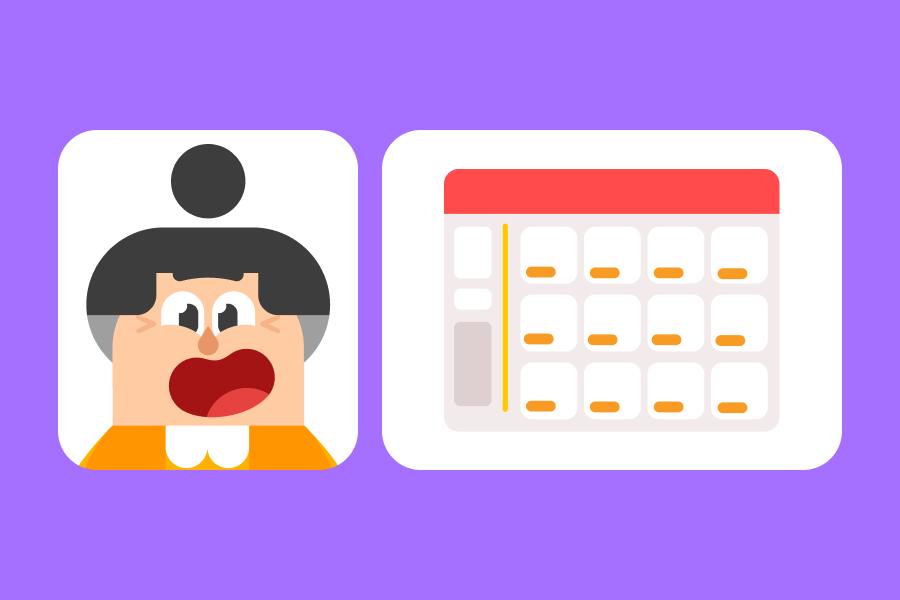English calendar terms are essential for learners to know—they help you discuss plans and schedules, whether you’re planning your school year or an upcoming trip abroad! There’s a lot of vocabulary to keep track of, and some important differences between English dialects.
Here’s everything you need to know about discussing days and dates in English!
In this post:
Basic calendar terms in English
The days of the week in English
The months of the year in English
How to write the date in English
Basic calendar terms in English
The basic English calendar terms are:
- day
- week
- month
- year
- decade (10 years)
- century (100 years)
- millennium (1000 years)
The days of the week in English
In English, the days of the week are always capitalized, and the calendar starts on Sunday in North America, but on Monday in many other countries.
To ask someone what day it is in English, you’ll say What day is it? or What day of the week is it?
You’ll notice in the table below that in addition to the complete word for each day of the week, each day also has an abbreviated form. This abbreviated form is often used in lists, tables and relatively informal writing, like text messages and less formal emails. In more formal writing, be sure to write out the full word.
Days of the week in English Abbreviated form Sunday Sun. Monday Mon. Tuesday Tue./Tues. Wednesday Wed./Weds. Thursday Thu./Thur./Thurs. Friday Fri. Saturday Sat.Other important vocabulary about days includes:
- today
- yesterday
- tomorrow
- weekend
- weekday
One English word means a very specific number of days: fortnight! It comes from the phrase fourteen nights, and it’s used in many parts of the English-speaking world, but seldom in the U.S.
The months of the year in English
Like the days of the week, in English the months of the year are also always capitalized. Most months of the year also have an abbreviated form in addition to their full form.
Months of the year in English Abbreviated form January Jan. February Feb. March Mar. April Apr. May (not typically abbreviated) June Jun. July Jul. August Aug. September Sep./Sept. October Oct. November Nov. December Dec.The four seasons in English are:
- winter
- spring
- summer
- autumn
In the U.S., you’ll often hear fall instead of autumn.
Which seasons you experience in which months depends on where you live! In the Northern Hemisphere, winter is officially in December, January, and February—but in the Southern Hemisphere, those are summer months!
To ask for the date, you can ask What is today’s date? or just What’s the date?
There are two main ways to say and write the date in English, and which you use depends on where you are! There’s one format used generally across the English-speaking world… and a different style is used in the U.S. 😅
The format used in most of the world is:
day + month + year.
Its abbreviation on forms is MM/DD/YYYY or MM/DD/YY—with the Ms for month before the Ds for day—so the first day of July is written 07/01/2025 or 07/01/25. When the date is spelled out, it will be July 1, 2025 or July 1.
It’s clear how confusing this is, even for English speakers! If you see the date written as “07/01” you’ll need to think about who wrote it and where they’re from: It could mean either the first day of July *or* the seventh day of January. You’ll have to do what English speakers do—ask for clarification. To be sure, you can also write out the month to make it clear what you mean.
In spoken language, the rules are a bit different: Instead of saying the cardinal number (like one or seventeen), you’ll use the ordinal number (like first or seventeenth). So for 1 July, you’ll hear the first of July, and for July 1, U.S. speakers will say July first. In fact, U.S. speakers *do* use the other format, sometimes—like when they celebrate the 4th of July!
The best *day* to practice English is *today*!
Learners of all levels will need to express and understand English calendar terms. Focus on practicing the words and expressions that are different from your own language—that way, your English tomorrow will be even better than today!

 Dan Houser Says GTA 6 Will Be 'Great' but Thinks 'The World Probably Had Enough GTA From Me' in First Comments Since Leaving Rockstar
Dan Houser Says GTA 6 Will Be 'Great' but Thinks 'The World Probably Had Enough GTA From Me' in First Comments Since Leaving Rockstar